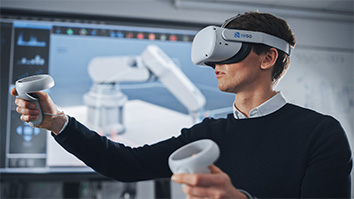Innovation is one of those words greatly in danger of overuse and exaggeration. These days, you hear the term mentioned in almost every corner of industry and even in reference to culture, society, and our personal lives.
At SRI, we don’t use the word “innovation” lightly. We have a clear and crisp definition for what it means: the creation and delivery of new customer value into a marketplace, with a sustainable business model for the organization producing it.
My organization at SRI is chartered with commercial and international business development. We have the unique perspective of seeing innovation unfold at the global level when we travel to places such as Japan, Chile, the Mideast, Turkey, the Nordics, and Korea, as well as throughout the USA.
We partner with the world’s best and brightest innovators, researchers, and entrepreneurs to share SRI’s best practices for innovation process—a process we’ve found central to the growth of our company.
So who are we to make this claim? Some background: SRI was founded by Stanford University in 1946 and became an independent, nonprofit research institution in 1970. We have more than 20 locations, 45 different R&D laboratories, and 2,200 researchers worldwide. Our 2011 revenues were approximately $585 million.
We have quite a compelling history of R&D commercialization. Some of our ventures are well known—Siri, Intuitive Surgical, and Nuance—while others are lesser known but still hugely successful and revenue generating: a treatment for drug-resistant malaria, the first disposable hearing aid, virtual advertising and imaging for TV, high-performance optical components, mobile networking solutions, advanced lighting, drugs for cancer and toxic diseases, etc.
Our Mission at SRI: Apply Science and Technology for the Good of Society
What makes us different from any other research institution, whether for-profit or nonprofit?
I’d refer you to our unique mission statement (the same since 1946): SRI, a nonprofit corporation, is committed to discovery and to the application of science and technology for knowledge, commerce, prosperity, and peace.
We take this very seriously. We understand that the opportunity to see sustained peace and order in the world is tightly woven with global prosperity. The more we can apply our expertise in research and development to raise the chance of advancement and the quality of life for those in society with the greatest needs, the more we help reduce the risks and destruction of war and societal unrest.
As a result, we work with the foreign countries’ central governments, universities, and other organizations, as well as team with our own federal government, to help them to develop an ecosystem for research, innovation, commercialization, entrepreneurship and economic growth.
Developing countries typically spend a very low percentage of their GDP on research and development. Developed nations like the U.S., Japan, Korea, the Nordics and Germany typically spend between 2-3 percent, while countries like Chile, Brazil, Mideast countries, Malaysia, Turkey, and Vietnam spend less than 1 percent.
And the sad truth is, most of this very limited amount of R&D ends up “sitting on the shelf” (as patents or publications) and does not get applied to mainstream use. Part of my organization’s mission is to help these countries focus on the “right” R&D to work on, and then apply proven processes, to successfully commercialize their R&D efforts.
For example, we’ve recently worked with a group of rising entrepreneurs from Chile. As part of our innovation programs, we hosted the group at SRI for an intensive month-long immersion in innovation and R&D best practices. These teams were working on a wide range of projects that included cancer diagnosis technology, surgical devices, and quality monitoring of agricultural exports. Our venture readiness program helps these teams convert their market needs, existing value and research into commercial successes.
In addition, we have begun partnering with the Stanford University Graduate School of Business to further both social and for-profit entrepreneurship initiatives. These programs stimulate and develop technological innovations and commercialization know-how and build viable companies in developing regions. I’ll be writing about these efforts in future blogs.
Most “for-profit” corporations are managed to make money for shareholders. In contrast, at SRI we believe in profitability coupled with the goal of raising the per-capita level of the poorest citizens in the world. To ensure we meet our goals, we reinvest whatever “profits” we have back into our people and our business. It’s a hugely successful equation.
I’ve enjoyed helping a number of organizations grow and provide high societal value over the course of my career, and I’m equally proud to work with my SRI colleagues and continue to broaden our vision of innovation and development. In the coming months, I’ll report on some of our most interesting developments and projects.



